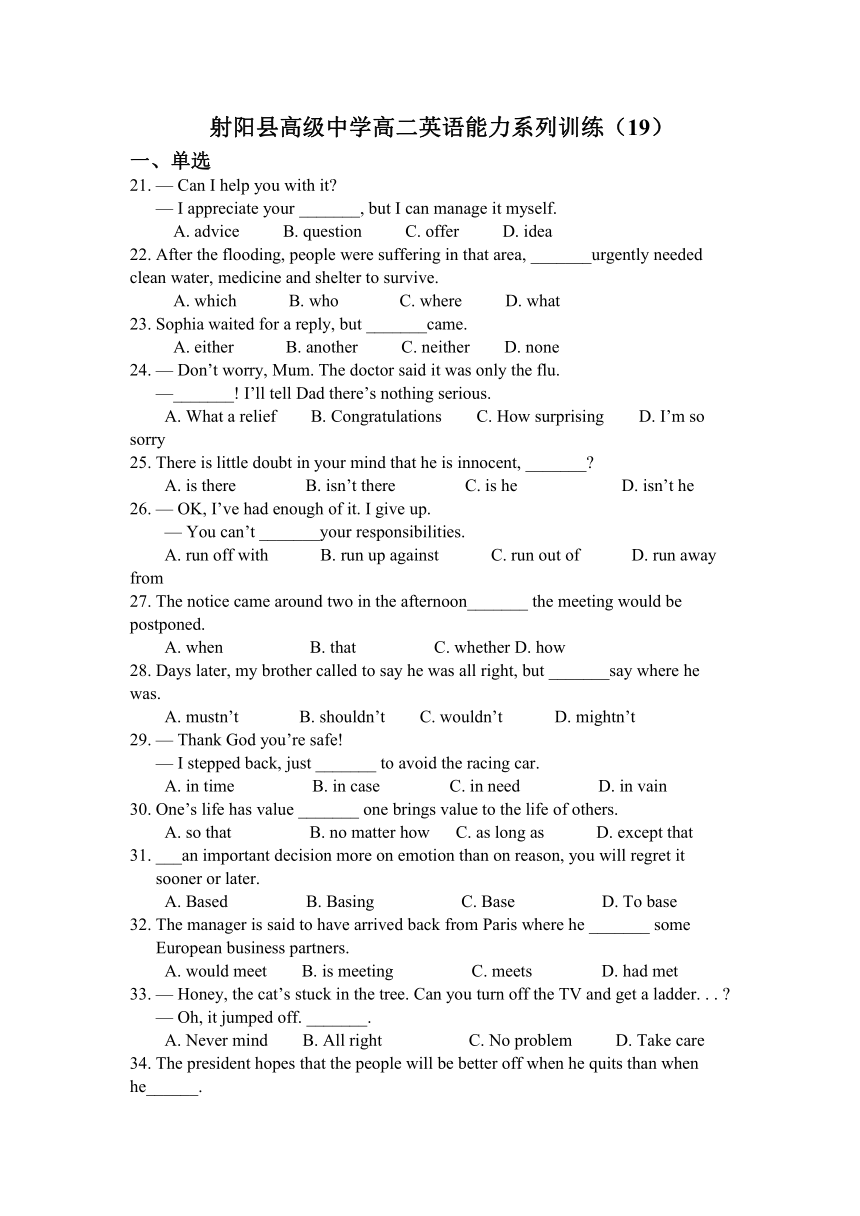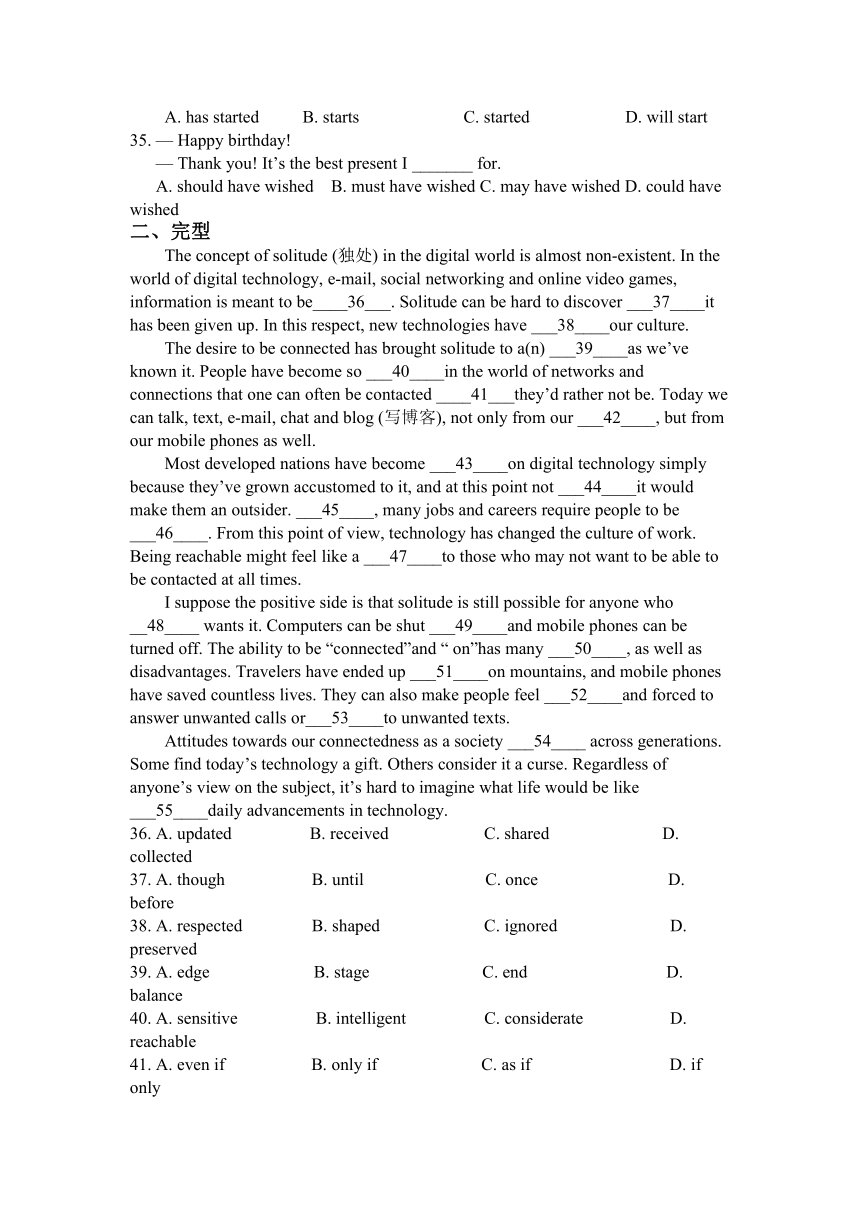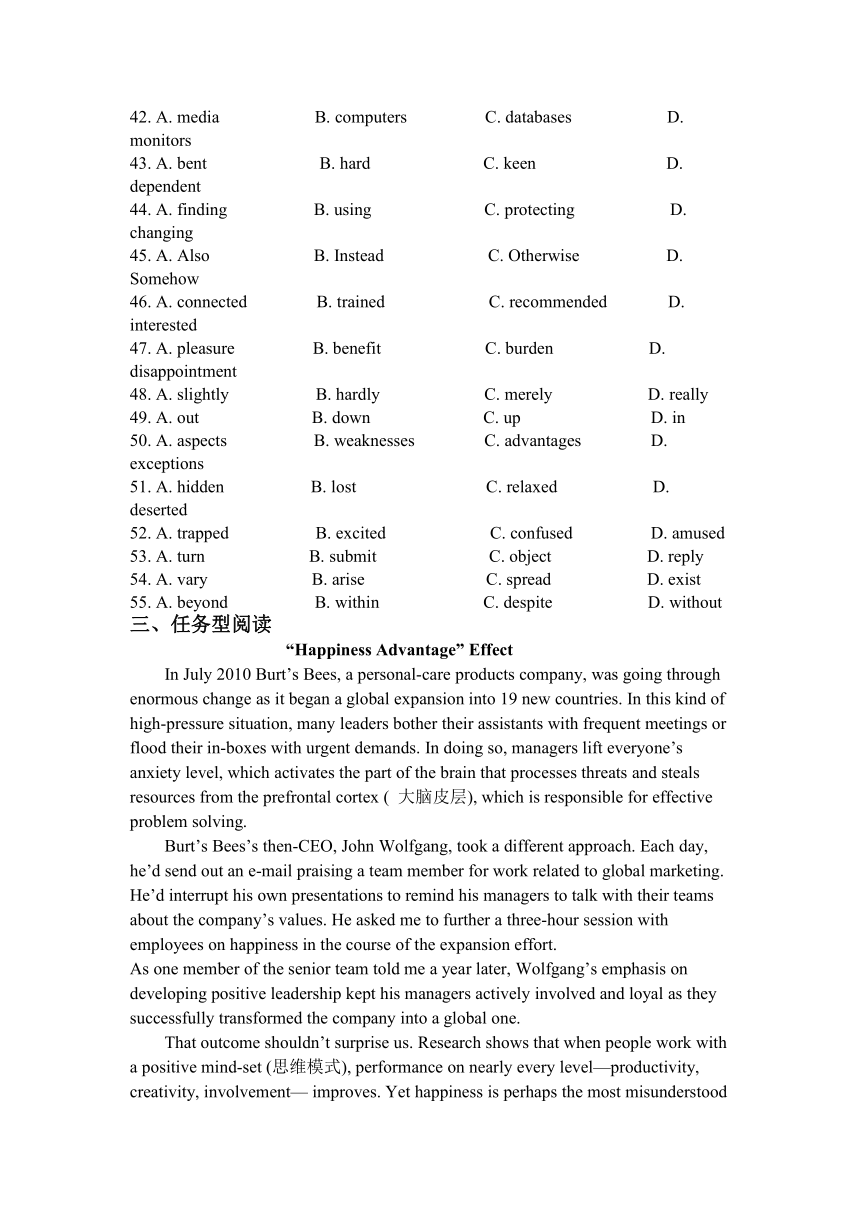射阳县高级中学高二英语能力系列训练(19)
文档属性
| 名称 | 射阳县高级中学高二英语能力系列训练(19) |  | |
| 格式 | zip | ||
| 文件大小 | 92.6KB | ||
| 资源类型 | 教案 | ||
| 版本资源 | 牛津译林版 | ||
| 科目 | 英语 | ||
| 更新时间 | 2012-10-04 10:14:16 | ||
图片预览



文档简介
射阳县高级中学高二英语能力系列训练(19)
一、单选
21. — Can I help you with it
— I appreciate your _______, but I can manage it myself.
A. advice B. question C. offer D. idea
22. After the flooding, people were suffering in that area, _______urgently needed clean water, medicine and shelter to survive.
A. which B. who C. where D. what
23. Sophia waited for a reply, but _______came.
A. either B. another C. neither D. none
24. — Don’t worry, Mum. The doctor said it was only the flu.
—_______! I’ll tell Dad there’s nothing serious.
A. What a relief B. Congratulations C. How surprising D. I’m so sorry
25. There is little doubt in your mind that he is innocent, _______
A. is there B. isn’t there C. is he D. isn’t he
26. — OK, I’ve had enough of it. I give up.
— You can’t _______your responsibilities.
A. run off with B. run up against C. run out of D. run away from
27. The notice came around two in the afternoon_______ the meeting would be postponed.
A. when B. that C. whether D. how
28. Days later, my brother called to say he was all right, but _______say where he was.
A. mustn’t B. shouldn’t C. wouldn’t D. mightn’t
29. — Thank God you’re safe!
— I stepped back, just _______ to avoid the racing car.
A. in time B. in case C. in need D. in vain
30. One’s life has value _______ one brings value to the life of others.
A. so that B. no matter how C. as long as D. except that
31. ___an important decision more on emotion than on reason, you will regret it sooner or later.
A. Based B. Basing C. Base D. To base
32. The manager is said to have arrived back from Paris where he _______ some European business partners.
A. would meet B. is meeting C. meets D. had met
33. — Honey, the cat’s stuck in the tree. Can you turn off the TV and get a ladder. . .
— Oh, it jumped off. _______.
A. Never mind B. All right C. No problem D. Take care
34. The president hopes that the people will be better off when he quits than when he______.
A. has started B. starts C. started D. will start
35. — Happy birthday!
— Thank you! It’s the best present I _______ for.
A. should have wished B. must have wished C. may have wished D. could have wished
二、完型
The concept of solitude (独处) in the digital world is almost non-existent. In the world of digital technology, e-mail, social networking and online video games, information is meant to be____36___. Solitude can be hard to discover ___37____it has been given up. In this respect, new technologies have ___38____our culture.
The desire to be connected has brought solitude to a(n) ___39____as we’ve known it. People have become so ___40____in the world of networks and connections that one can often be contacted ____41___they’d rather not be. Today we can talk, text, e-mail, chat and blog (写博客), not only from our ___42____, but from our mobile phones as well.
Most developed nations have become ___43____on digital technology simply because they’ve grown accustomed to it, and at this point not ___44____it would make them an outsider. ___45____, many jobs and careers require people to be ___46____. From this point of view, technology has changed the culture of work. Being reachable might feel like a ___47____to those who may not want to be able to be contacted at all times.
I suppose the positive side is that solitude is still possible for anyone who __48____ wants puters can be shut ___49____and mobile phones can be turned off. The ability to be “connected”and “ on”has many ___50____, as well as disadvantages. Travelers have ended up ___51____on mountains, and mobile phones have saved countless lives. They can also make people feel ___52____and forced to answer unwanted calls or___53____to unwanted texts.
Attitudes towards our connectedness as a society ___54____ across generations. Some find today’s technology a gift. Others consider it a curse. Regardless of anyone’s view on the subject, it’s hard to imagine what life would be like ___55____daily advancements in technology.
36. A. updated B. received C. shared D. collected
37. A. though B. until C. once D. before
38. A. respected B. shaped C. ignored D. preserved
39. A. edge B. stage C. end D. balance
40. A. sensitive B. intelligent C. considerate D. reachable
41. A. even if B. only if C. as if D. if only
42. A. media B. computers C. databases D. monitors
43. A. bent B. hard C. keen D. dependent
44. A. finding B. using C. protecting D. changing
45. A. Also B. Instead C. Otherwise D. Somehow
46. A. connected B. trained C. recommended D. interested
47. A. pleasure B. benefit C. burden D. disappointment
48. A. slightly B. hardly C. merely D. really
49. A. out B. down C. up D. in
50. A. aspects B. weaknesses C. advantages D. exceptions
51. A. hidden B. lost C. relaxed D. deserted
52. A. trapped B. excited C. confused D. amused
53. A. turn B. submit C. object D. reply
54. A. vary B. arise C. spread D. exist
55. A. beyond B. within C. despite D. without
三、任务型阅读
“Happiness Advantage” Effect
In July 2010 Burt’s Bees, a personal-care products company, was going through enormous change as it began a global expansion into 19 new countries. In this kind of high-pressure situation, many leaders bother their assistants with frequent meetings or flood their in-boxes with urgent demands. In doing so, managers lift everyone’s anxiety level, which activates the part of the brain that processes threats and steals resources from the prefrontal cortex ( 大脑皮层), which is responsible for effective problem solving.
Burt’s Bees’s then-CEO, John Wolfgang, took a different approach. Each day, he’d send out an e-mail praising a team member for work related to global marketing. He’d interrupt his own presentations to remind his managers to talk with their teams about the company’s values. He asked me to further a three-hour session with employees on happiness in the course of the expansion effort.
As one member of the senior team told me a year later, Wolfgang’s emphasis on developing positive leadership kept his managers actively involved and loyal as they successfully transformed the company into a global one.
That outcome shouldn’t surprise us. Research shows that when people work with a positive mind-set (思维模式), performance on nearly every level—productivity, creativity, involvement— improves. Yet happiness is perhaps the most misunderstood driver of performance. For one, most people believe that success comes before happiness. “Once I get a promotion, I’ll be happy,” they think. Or, “Once I hit my sales target, I’ll feel great. ”But because success is a moving target—as soon as you hit your target, you raise it again—the happiness that results from success does not last long.
In fact, it works the other way around: People who have a positive mind-set perform better in the face of challenge. I call this the “happiness advantage”—every business outcome shows improvement when the brain is positive. I’ve observed this effect in my role as a researcher and lecturer in 48 countries on the connection between employee happiness and success. And I’m not alone: In an analysis of 225 academic studies, researchers found strong evidence of cause-and-effect relationship between life satisfaction and successful business outcomes.
Another common misunderstanding is that our genetics, our environment, or a combination of the two determines how happy we are. To be sure, both factors have an impact. But one’s general sense of well-being is surprisingly unstable. The habits you form, the way you interact with colleagues, how you think about stress—all these can be managed to increase your happiness and your chances of success.
单选
21. C 22. B 23. D 24. A 25. A 26. D 27. B 28. C 29. A 30. C
31. B 32. D 33. A 34. C 35. D
完型
36. C 37. C 38. B 39. C 40. D
41. A 42. B 43. D 44. B 45. A
46. A 47. C 48. D 49. B 50. C
51. B 52. A 53. D 54. A 55. D
71. bother/ annoy 72. anxiety/ concern/ worry
73. considerate/ aware/ conscious
74. loyal/ faithful/ devoted/ committed
75. difference 76. positively
77. success/ achievements 78. strongly
79. determined/ decided 80. chances/ possibilities/ opportunities
一、单选
21. — Can I help you with it
— I appreciate your _______, but I can manage it myself.
A. advice B. question C. offer D. idea
22. After the flooding, people were suffering in that area, _______urgently needed clean water, medicine and shelter to survive.
A. which B. who C. where D. what
23. Sophia waited for a reply, but _______came.
A. either B. another C. neither D. none
24. — Don’t worry, Mum. The doctor said it was only the flu.
—_______! I’ll tell Dad there’s nothing serious.
A. What a relief B. Congratulations C. How surprising D. I’m so sorry
25. There is little doubt in your mind that he is innocent, _______
A. is there B. isn’t there C. is he D. isn’t he
26. — OK, I’ve had enough of it. I give up.
— You can’t _______your responsibilities.
A. run off with B. run up against C. run out of D. run away from
27. The notice came around two in the afternoon_______ the meeting would be postponed.
A. when B. that C. whether D. how
28. Days later, my brother called to say he was all right, but _______say where he was.
A. mustn’t B. shouldn’t C. wouldn’t D. mightn’t
29. — Thank God you’re safe!
— I stepped back, just _______ to avoid the racing car.
A. in time B. in case C. in need D. in vain
30. One’s life has value _______ one brings value to the life of others.
A. so that B. no matter how C. as long as D. except that
31. ___an important decision more on emotion than on reason, you will regret it sooner or later.
A. Based B. Basing C. Base D. To base
32. The manager is said to have arrived back from Paris where he _______ some European business partners.
A. would meet B. is meeting C. meets D. had met
33. — Honey, the cat’s stuck in the tree. Can you turn off the TV and get a ladder. . .
— Oh, it jumped off. _______.
A. Never mind B. All right C. No problem D. Take care
34. The president hopes that the people will be better off when he quits than when he______.
A. has started B. starts C. started D. will start
35. — Happy birthday!
— Thank you! It’s the best present I _______ for.
A. should have wished B. must have wished C. may have wished D. could have wished
二、完型
The concept of solitude (独处) in the digital world is almost non-existent. In the world of digital technology, e-mail, social networking and online video games, information is meant to be____36___. Solitude can be hard to discover ___37____it has been given up. In this respect, new technologies have ___38____our culture.
The desire to be connected has brought solitude to a(n) ___39____as we’ve known it. People have become so ___40____in the world of networks and connections that one can often be contacted ____41___they’d rather not be. Today we can talk, text, e-mail, chat and blog (写博客), not only from our ___42____, but from our mobile phones as well.
Most developed nations have become ___43____on digital technology simply because they’ve grown accustomed to it, and at this point not ___44____it would make them an outsider. ___45____, many jobs and careers require people to be ___46____. From this point of view, technology has changed the culture of work. Being reachable might feel like a ___47____to those who may not want to be able to be contacted at all times.
I suppose the positive side is that solitude is still possible for anyone who __48____ wants puters can be shut ___49____and mobile phones can be turned off. The ability to be “connected”and “ on”has many ___50____, as well as disadvantages. Travelers have ended up ___51____on mountains, and mobile phones have saved countless lives. They can also make people feel ___52____and forced to answer unwanted calls or___53____to unwanted texts.
Attitudes towards our connectedness as a society ___54____ across generations. Some find today’s technology a gift. Others consider it a curse. Regardless of anyone’s view on the subject, it’s hard to imagine what life would be like ___55____daily advancements in technology.
36. A. updated B. received C. shared D. collected
37. A. though B. until C. once D. before
38. A. respected B. shaped C. ignored D. preserved
39. A. edge B. stage C. end D. balance
40. A. sensitive B. intelligent C. considerate D. reachable
41. A. even if B. only if C. as if D. if only
42. A. media B. computers C. databases D. monitors
43. A. bent B. hard C. keen D. dependent
44. A. finding B. using C. protecting D. changing
45. A. Also B. Instead C. Otherwise D. Somehow
46. A. connected B. trained C. recommended D. interested
47. A. pleasure B. benefit C. burden D. disappointment
48. A. slightly B. hardly C. merely D. really
49. A. out B. down C. up D. in
50. A. aspects B. weaknesses C. advantages D. exceptions
51. A. hidden B. lost C. relaxed D. deserted
52. A. trapped B. excited C. confused D. amused
53. A. turn B. submit C. object D. reply
54. A. vary B. arise C. spread D. exist
55. A. beyond B. within C. despite D. without
三、任务型阅读
“Happiness Advantage” Effect
In July 2010 Burt’s Bees, a personal-care products company, was going through enormous change as it began a global expansion into 19 new countries. In this kind of high-pressure situation, many leaders bother their assistants with frequent meetings or flood their in-boxes with urgent demands. In doing so, managers lift everyone’s anxiety level, which activates the part of the brain that processes threats and steals resources from the prefrontal cortex ( 大脑皮层), which is responsible for effective problem solving.
Burt’s Bees’s then-CEO, John Wolfgang, took a different approach. Each day, he’d send out an e-mail praising a team member for work related to global marketing. He’d interrupt his own presentations to remind his managers to talk with their teams about the company’s values. He asked me to further a three-hour session with employees on happiness in the course of the expansion effort.
As one member of the senior team told me a year later, Wolfgang’s emphasis on developing positive leadership kept his managers actively involved and loyal as they successfully transformed the company into a global one.
That outcome shouldn’t surprise us. Research shows that when people work with a positive mind-set (思维模式), performance on nearly every level—productivity, creativity, involvement— improves. Yet happiness is perhaps the most misunderstood driver of performance. For one, most people believe that success comes before happiness. “Once I get a promotion, I’ll be happy,” they think. Or, “Once I hit my sales target, I’ll feel great. ”But because success is a moving target—as soon as you hit your target, you raise it again—the happiness that results from success does not last long.
In fact, it works the other way around: People who have a positive mind-set perform better in the face of challenge. I call this the “happiness advantage”—every business outcome shows improvement when the brain is positive. I’ve observed this effect in my role as a researcher and lecturer in 48 countries on the connection between employee happiness and success. And I’m not alone: In an analysis of 225 academic studies, researchers found strong evidence of cause-and-effect relationship between life satisfaction and successful business outcomes.
Another common misunderstanding is that our genetics, our environment, or a combination of the two determines how happy we are. To be sure, both factors have an impact. But one’s general sense of well-being is surprisingly unstable. The habits you form, the way you interact with colleagues, how you think about stress—all these can be managed to increase your happiness and your chances of success.
单选
21. C 22. B 23. D 24. A 25. A 26. D 27. B 28. C 29. A 30. C
31. B 32. D 33. A 34. C 35. D
完型
36. C 37. C 38. B 39. C 40. D
41. A 42. B 43. D 44. B 45. A
46. A 47. C 48. D 49. B 50. C
51. B 52. A 53. D 54. A 55. D
71. bother/ annoy 72. anxiety/ concern/ worry
73. considerate/ aware/ conscious
74. loyal/ faithful/ devoted/ committed
75. difference 76. positively
77. success/ achievements 78. strongly
79. determined/ decided 80. chances/ possibilities/ opportunities
同课章节目录
